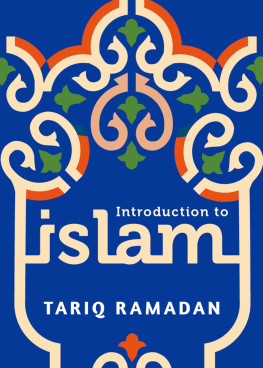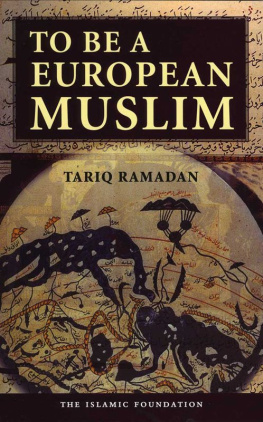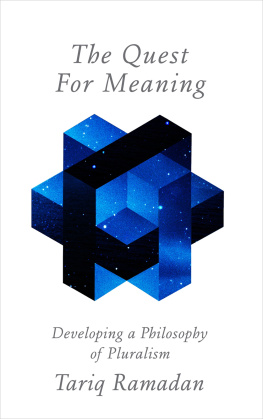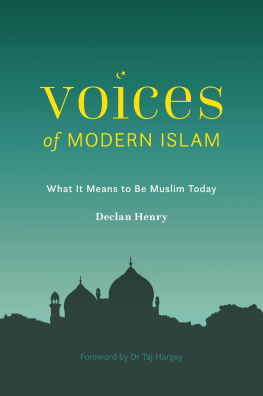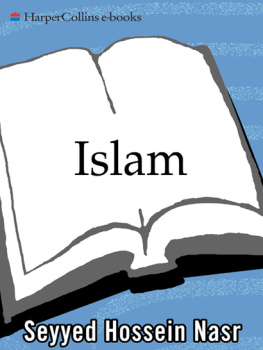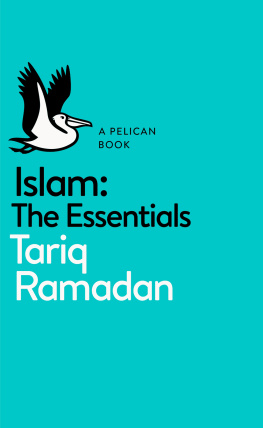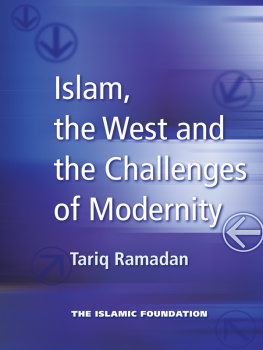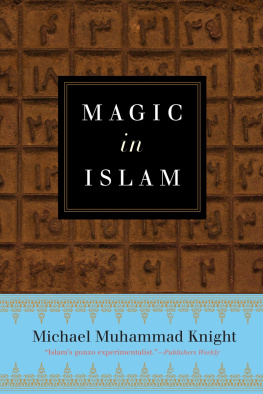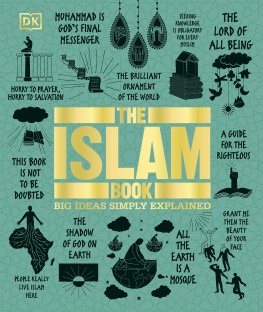INTRODUCTION TO ISLAM

Oxford University Press is a department of the University of Oxford. It furthers the Universitys objective of excellence in research, scholarship, and education by publishing worldwide. Oxford is a registered trade mark of Oxford University Press in the UK and certain other countries.
Published in the United States of America by Oxford University Press
198 Madison Avenue, New York, NY 10016, United States of America.
Oxford University Press 2017
All rights reserved. No part of this publication may be reproduced, stored in a retrieval system, or transmitted, in any form or by any means, without the prior permission in writing of Oxford University Press, or as expressly permitted by law, by license, or under terms agreed with the appropriate reproduction rights organization. Inquiries concerning reproduction outside the scope of the above should be sent to the Rights Department, Oxford University Press, at the address above.
You must not circulate this work in any other form and you must impose this same condition on any acquirer.
Library of Congress Cataloging-in-Publication Data
Names: Ramadan, Tariq, author.
Title: Introduction to Islam / Tariq Ramadan.
Description: New York, NY : Oxford University Press, 2017. | Includes bibliographical references and index.
Identifiers: LCCN 2017004515 (print) | LCCN 2017006482 (ebook) | ISBN 9780190467487 (paperback) | ISBN 9780190467494 (epdf) | ISBN 9780190467500 (epub)
Subjects: LCSH: Islam. | IslamDoctrines. | IslamCustoms and practices. | BISAC: RELIGION / Islam / General. | RELIGION / Islam / History. | RELIGION / Islam / Rituals & Practice.
Classification: LCC BP161.3 .R36 2017 (print) | LCC BP161.3 (ebook) | DDC 297dc23
LC record available at https://lccn.loc.gov/2017004515
For Caroline,
With all my gratitude and
boundless respect
CONTENTS
Achieving simplicity proved to be anything but simple. This bookan initiation into Islamwas intended to be accessible and concise. Little did I realize the effort involved in making it so! In finished form at last, it represents the synthesis of lectures, studies, and essays too numerous to mention, and of actual experience gained over the years as a student, as a teacher, and as an intellectual deeply involved both in public debate and at the grass roots. These are the major factors, combined with the contributions of so many women and men encountered along the wayMuslims, believers of other confessions or without any particular confessionthat have given me the impetus and the strength to write. My debt to them constitutes the guiding spirit of this short introductory volume.
First and foremost, I would like to thank Oxford University Press, and particularly Cynthia Read, for her fraternal presence, her kindness, and her permanent support. She has accompanied me for so long with heart, attention, and professional discipline. My warmest thoughts go to Helen Conford, from Penguin Books, for her confidence, her trust, her kindness, and her friendship. Deepest thanks as well go to my friend and translator Fred A. Reed for his contribution and his devotion despite the years of tight deadlines and an often trying work schedule. Finally, a word of thanks to Cameron Donahue and Rokadia Shoaib: they have contributed, in their respective fields, to the conception and distribution of this book. To all: the work of writing would be for naught without your clear-eyed and fine-tuned professional collaboration.
This book, in its present form, would never have seen the light of day without the contribution of Caroline Davis, my assistant and program manager at Oxford University: a woman of heart, and of principle, and a model of great professionalism and deep humanity. To her I respectfully dedicate this work. Jennifer Reghoui, who managed my European office for five years, was unfailing in her support. My dear and supportive colleagues at the Middle East Centre at St Antonys College, University of Oxford: Eugene Rogan, Walter Armbrust, Michael Willis, Laurent Mignon, Toby Matthiesen, Philip Robins, and Avi Shlaim. Walaa Quisay, one of my doctorate students, for her conscientious research assistance. The entire team of the Center for Islamic Legislation and Ethics that has stood by me for four years will find in these pages ample reminders of our animated discussions. My profound gratitude goes to each and every one of you.
For Iman, always and intensely. For Maryam, Sami, Moussa, and Najma with a fathers heart. For Shaima and Ali, with love. And, multiplying that same love today, for Kylian, Noor, Amin... and the others soon to some, God willing. How much I owe you all! Nor can I ever forget my mother, to whom my debt is so great, may God protect her; my father, may Gods grace be upon him; and Aymen, Bilal, Yasser, Arwa, Hani, my sister and my brothers. May their children and our children explore the high road and the byways of the great journey with hope and conviction. And may that journey always be one of beauty.
My thanks, my true and deepest thanks.
Oxford, November 2016
All Quranic references are indicated by chapter and verse in brackets after the quotation. Arabic terms that are now commonplace in English, such as sharia, jihad, halal, Ramadan, and others, have not been italicized. Other, more specialized terms appear in italics with diacritical marks. They appear once or several times in the text along with their translation and/or explanation, and are defined in the Glossary. All the translations are my own.
Tariq Ramadan
Oxford, December 2016
Hardly a day goes by without some mention of Islam. And yet many people, if pressed, will admit that they know very little about the religion of one-quarter of the human race. We hear much talk of violence, terrorism, the status of women, and slavery. Muslims are frequently pressured to provide answers on and justify what Islam is not. Yet there is very little space in society and in the media for an exploration and an explanation of what Islam genuinely is.
Hence the objective of this short book: to introduce readers in the simplest, most directand the most thoroughmanner to Islam, to its principles, its rituals, its history, its diversity, and its evolution, not forgetting the numerous challenges facing Muslims today.
Tackling an entire religion and civilization requires some mental preparation. The Islamic universe is no less complex than that of Hinduism, of Buddhism, of Judaism, or of Christianity. The basic texts can be abstruse and their interpretation widely divergent and often contradictory; Islams schools of thought and its cultures do not always facilitate access to its essence as a world religion.
Before venturing into a belief system that possesses its own well-established principles, an inner coherence, and a distinct conception of humanity, life, and death, readers may wish to put aside their preconceived notions and open their minds to something that may strike them as both familiar and strange. Islam comes complete with its own sacred texts, a system of references, eternal principles, and applications to daily life; as such, religious, historical, and legal knowledge are needed to understand its nature, its historical development, and the challenges confronting it today.
For many readers, this journey of discovery will require both curiosity and effort. But it will also require intellectual humility as the path unfolds before us, a willingness to reconsider opinions often presented as established fact, and the intention to overcome stubborn prejudices and to suspend judgment for the duration of our voyage together. As we progress, these considerations will take on prime importance, for they will enable us to join the debate over key issues and to begin a process of critical reflection we so sorely need today, free of knee-jerk reactions, fears, or attempts to justify the unjustifiable.

